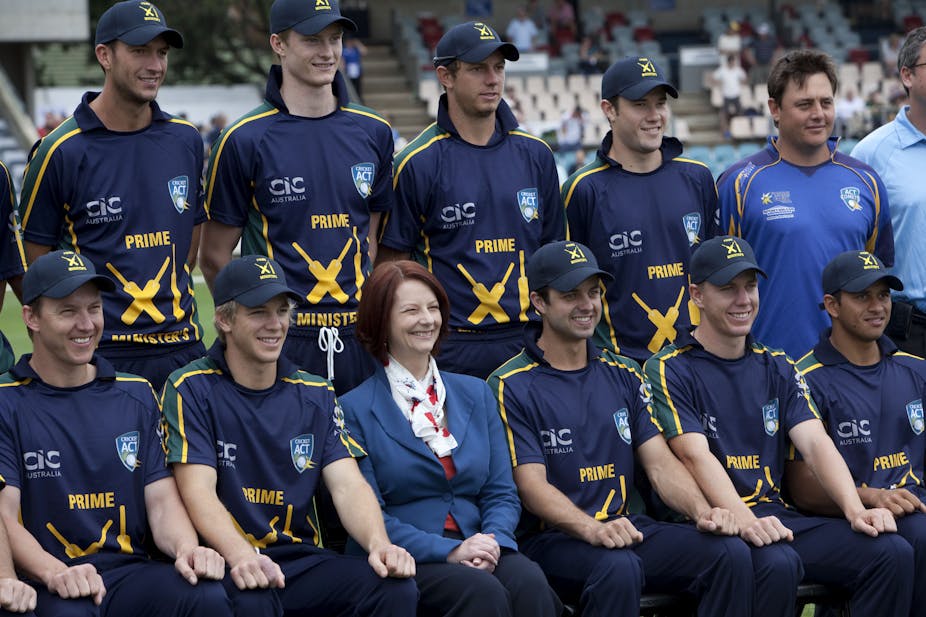It was the last sitting day of the federal parliament for the year. Opposition leader Tony Abbott was suggesting that prime minister Julia Gillard was a criminal, who in turn was rehearsing her lines that he was a misogynist hooked on negativity.
Then, word came through that a former Australian cricket captain had announced his retirement.
Hostilities were suspended during Statements on Indulgence concerning “Ponting, Mr Ricky Thomas, AO” by Gillard, Abbott, Scott Morrison (Ponting’s local member in New South Wales) and Geoff Lyons (the member from his original Tasmania constituency).

Sport was celebrated later during the prime minister’s On Indulgence Christmas Statement which averred that, despite our recent election to the UN Security Council, “good days in Australia often revolve around sport more than they do around diplomacy”. Australian performances in the Olympics and the Paralympics were praised, along with careful geo-political sporting name checks for Queensland (cricket, A-League, NRL), Sydney (NRL) and Melbourne (AFL), while slipping in the obligatory lament for the under-performance of the Bulldogs AFL team.
One of the immutable laws of Australian politics is that any aspiring or serving representative of the people must be a passionate sport fan, even if they have to fake it.
There are, no doubt, genuine sport nuts in Australian politics. We have the footage of embarrassing displays by Bob Hawke and others in the throes of sport-induced ecstasy as unimpeachable evidence.
John Howard’s melancholic reflection that being the national cricket captain – crucially, of the men’s team - is “really the pinnacle of human achievement almost, in Australia,” suggests that for some (especially male) elected members, politics is the lesser vocation pursued only because of insufficient athletic skill.
No particular stigma attaches to Australian politicians who are “sport tragics”. Sport is a freely available means of humanising them, a ready way of showing that, despite the scripted morning media mantras and the backroom Machiavellian manoeuvrings, they’re just like the rest of us. Except, of course, for those among the rest of us who aren’t sport fans.
So, if there is a risk to observing the law of sporting love, it is that a decent-sized component of your constituency will find declarations of love for your team and wearing dorky sports paraphernalia irrelevant and irritating, rather than endearing and amusing. They may even prefer politicians to concentrate on parliamentary matters, leaving the sport maniac role to people with more spare time on their hands, to be pursued privately among consenting adults.
A second, more serious, risk for politicians behaving as if they’re extras in a blokey beer ad is that they may be exposed as desperate populists who are doing so on the advice of their image consultants.
One of the most risible cases of suddenly invented sport-loving roots was the attempt by Paul Keating during his prime ministership to masquerade as a rusted-on Collingwood supporter. This was about as convincing a proposition as if his then rival John Howard had claimed a life-long attachment to the aesthetic principles of the Angry Penguins movement of cultural modernists.

But here, the third risk of confecting a love of sport for the people comes into focus. Even if people like sport in general, they generally do not warm to the opponents of their favourite teams. So, the bone-headed choice of Collingwood, based presumably on it being the biggest AFL club in a historically Labor-leaning zone of Melbourne, neglected to appreciate that, like the English Premier League’s Manchester United, it is simultaneously the most supported and most reviled team in the game. Even if sport aficionados buy the sport conversion, they may also associate it with loving the enemy.
There are exceptions to the law of political sport love in Australia. Current federal Foreign Minister and former New South Wales Premier Bob Carr has maintained his dignity by never pretending to have an interest in sport.
Nonetheless, as host state premier for the 2000 Sydney Olympics he appreciated a giant marketing exercise for the city that he exploited to the full. Carr now guards their legacy as the “best Games ever”, telling the UK’s Telegraph that, “They said something wonderful about the funny, friendly country that Australia is”. He is on safe political ground in extolling sport’s social and economic virtues without actually knowing or caring about how it is played.
Despite the inherent risks of populist flirtation, governments and oppositions alike have settled in for a long innings of indulgence in sport love. Ponting’s retirement will not be the last time parliamentary mud-slinging is halted to farewell a cricketer.

